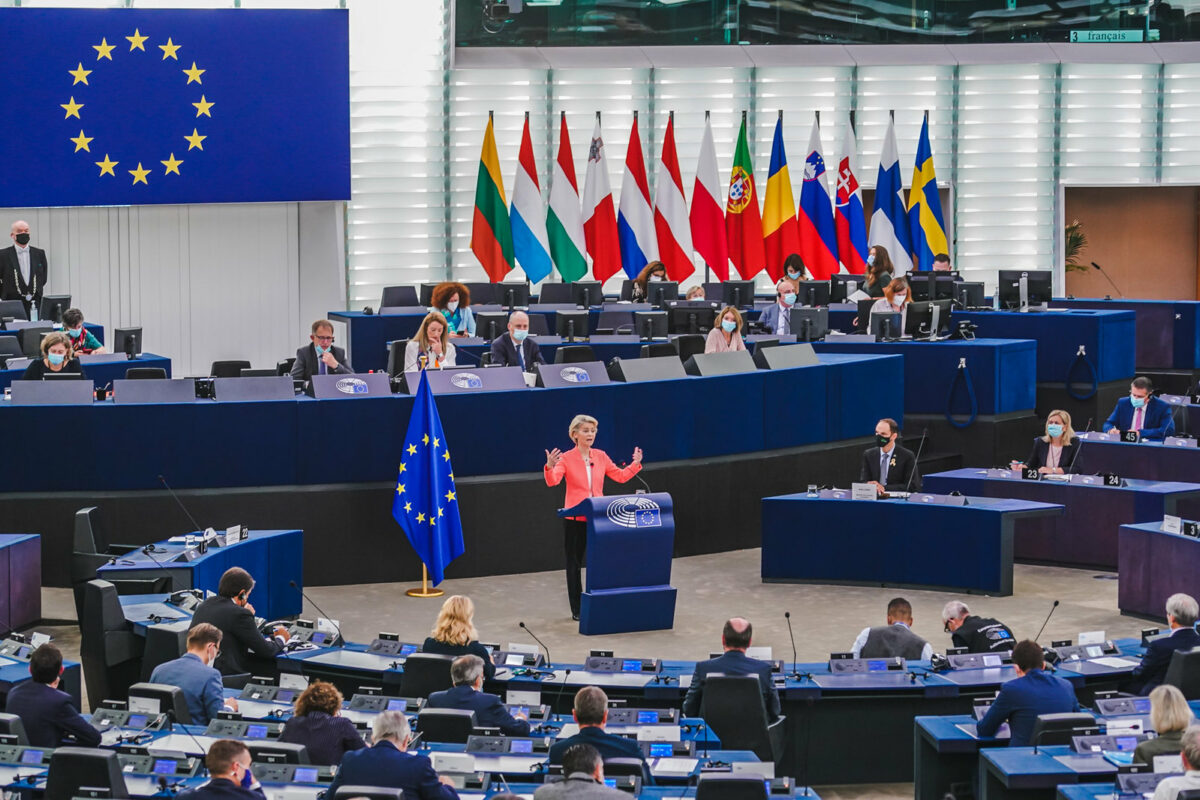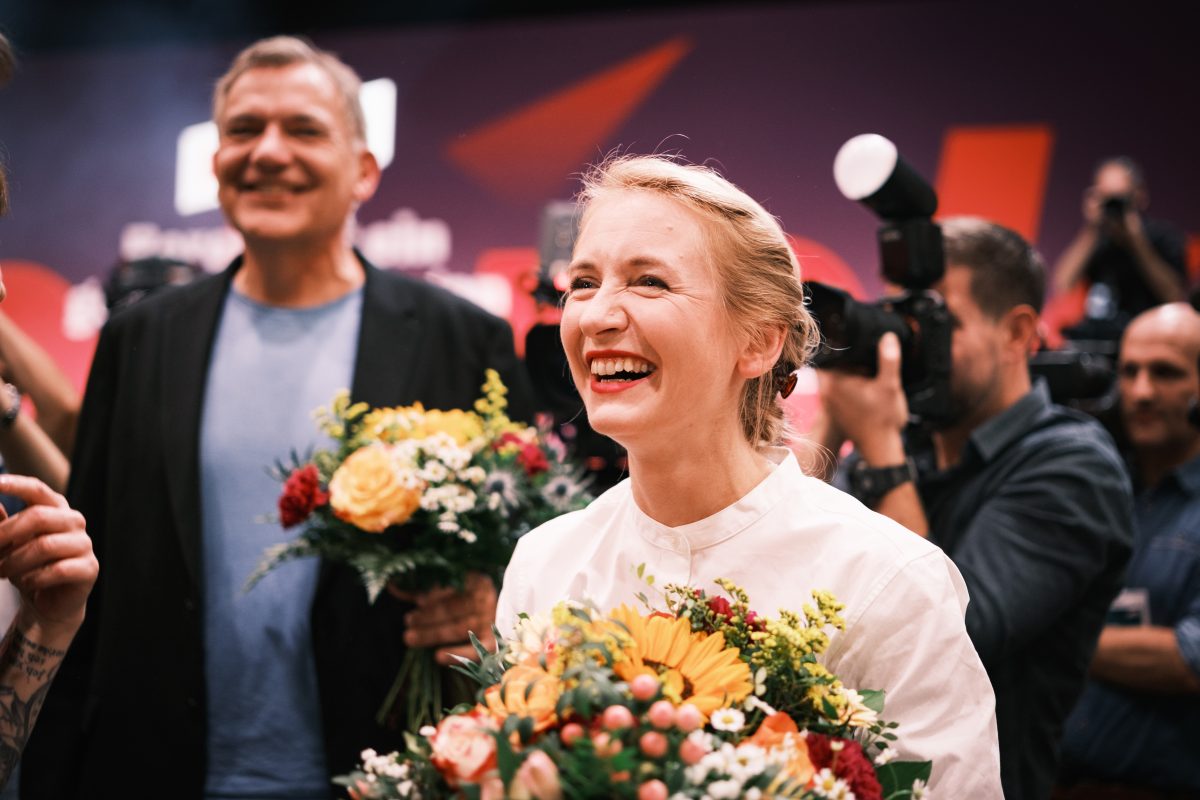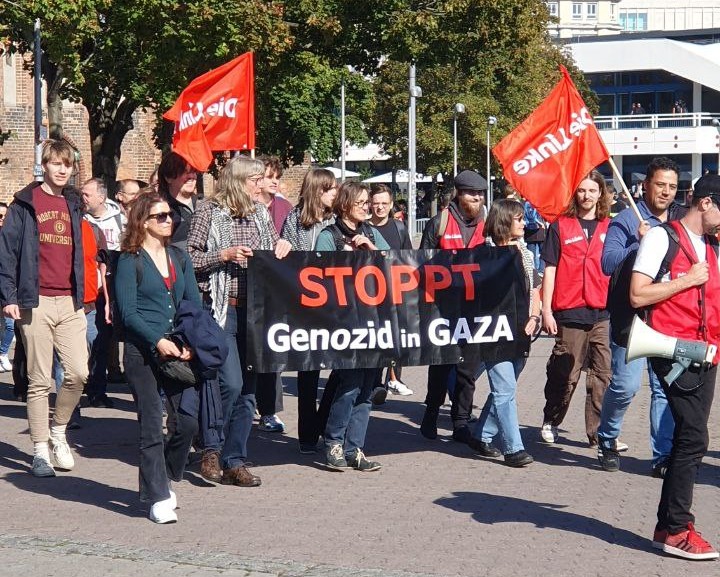The recent June election results across the European Union (EU) were predictable and reflect the current needs of EU capitalism. The ongoing crisis forces changes for the ruling class, and restructuring of their ruling parties. The problem for the ruling class is that a significant majority no longer trust or have faith in their rulers. Their traditional or standard parties ruling class parties have increasingly little appeal or ability to fool the working class and petit bourgeoisie. These standard parties are in two broad wings. Historically they were tailored to disguise this reality and to appeal to differing fractions of working people.
One wing of standard parties are the conservative parties basing an appeal to the petit bourgeoisie. In contrast, the standard ‘left’ parties form the other wing. They adopted pseudo-socialist slogans in social-democratic parties. They aimed their appeal at the more advanced section of the population, the working class – or those who have seen through – to a certain extent – the contradictions of classes within capitalism.
The increasing loss of credibility of both wings of the traditional parties forces re-structuring. They adopt new facades, with accommodations with openly neo-fascist parties.
This article focuses primarily on Europe, but its analysis applies to other capitalist countries.
What was the crisis faced by the capitalists over the prior ten years?
In Europe, there was a profound contraction in economic growth in the Eurozone. This is seen in the Gross Domestic Product.
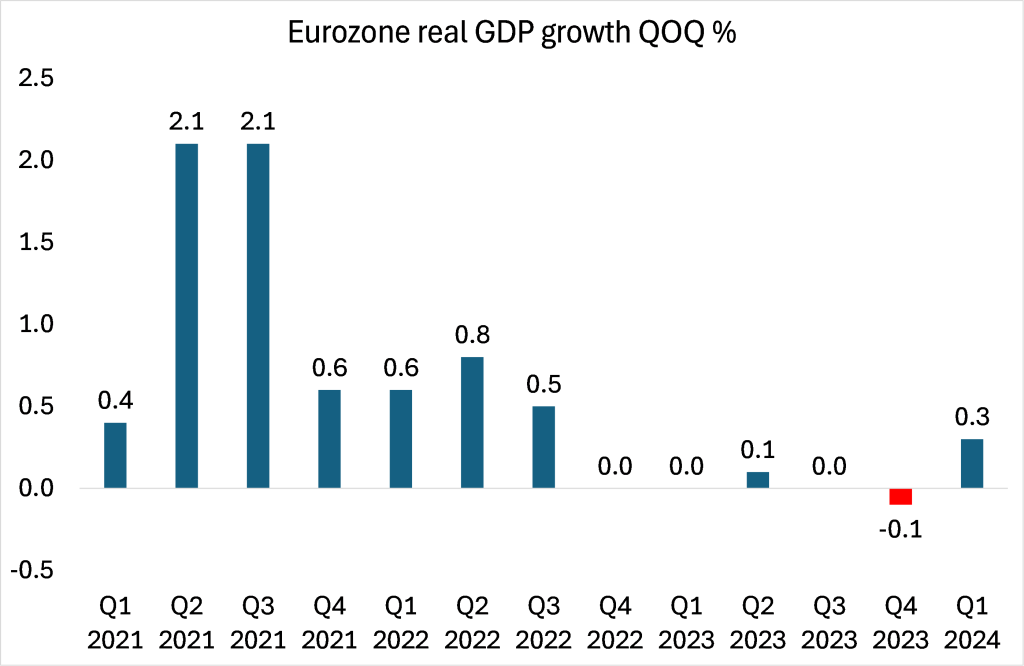
It was especially noticeable in Germany, long seen as ‘the locomotive’ of Europe.
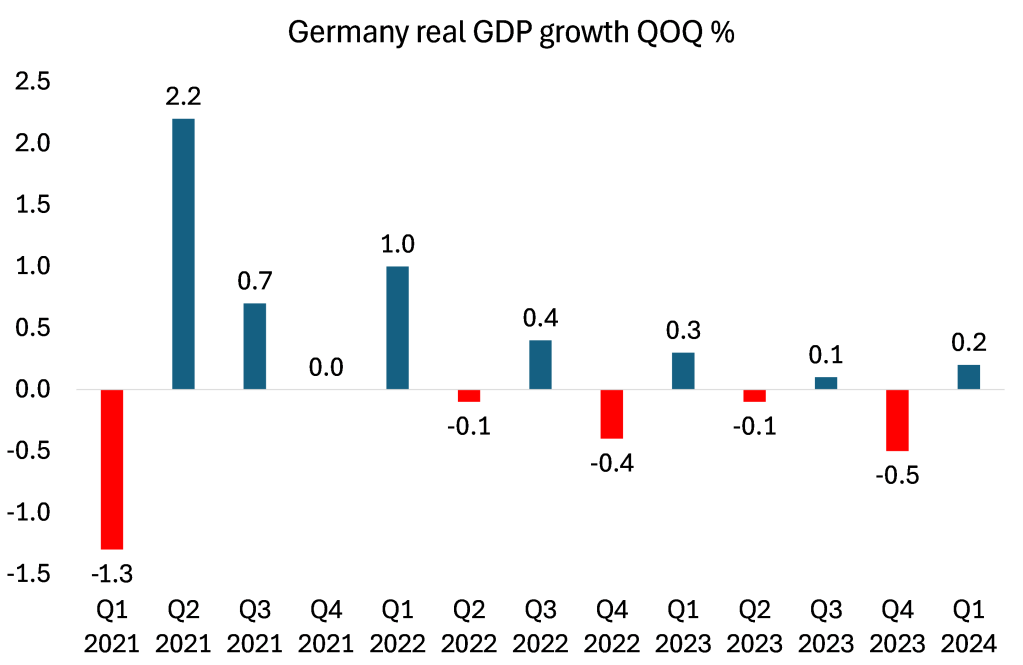
Attempts to deal with this are being made. The more clear-sighted of the European ruling classes, recognise the need for more centralisation and pooling of resources as:
Europe’s share of the global economy is shrinking, and fears are deepening that the continent can no longer keep up with the United States and China. “We are too small,” said Enrico Letta, a former Italian prime minister who recently delivered a report on the future of the single market to the European Union.
For more than a decade, Europe has been falling behind on several measures of competitiveness, including capital investments, research and development, and productivity growth.
“Our organization, decision-making and financing are designed for ‘the world of yesterday’ — pre-Covid, pre-Ukraine, preconflagration in the Middle East, pre-return of great power rivalry,” said Mario Draghi, a former president of the European Central Bank who is heading a study of Europe’s competitiveness.”
Patricia Cohen; “Europe Has Fallen Behind the U.S. and China. Can It Catch Up?” NYT June 5, 2024
But equally some of the smaller nations within the EU fear being swallowed
“But many smaller nations, including Ireland, Romania and Sweden, have opposed ceding power to Brussels or changing their laws, worried about putting their national financial industries at a disadvantage.
Civil society organizations are also concerned about the concentration of power.”
Patricia Cohen; “Europe Has Fallen Behind the U.S. and China. Can It Catch Up?” NYT June 5, 2024.
Naturally the crisis of profits has been ‘carried’ by lower worker wages:
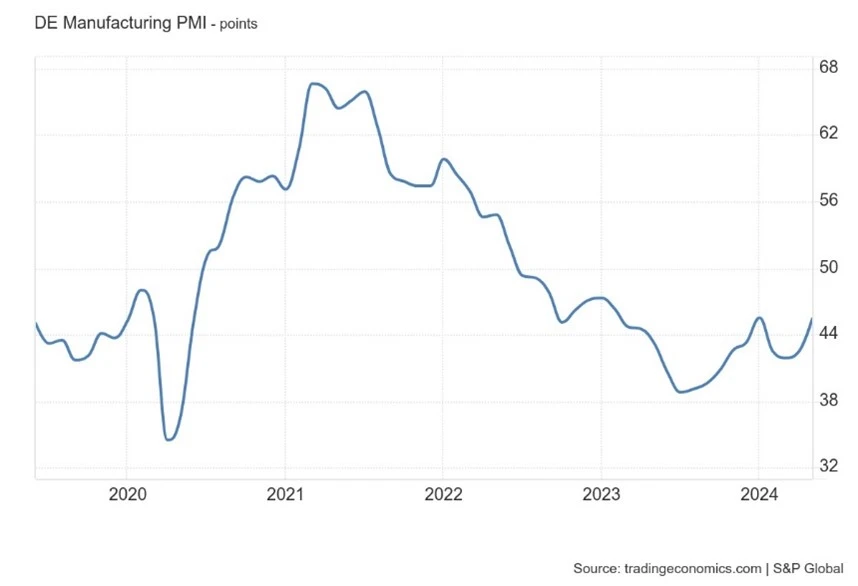
The depression of the working class standards of life are evident throughout the EU. More than 1/5th of the EU population is at risk of poverty.
No wonder the working class of these countries have lost hope in the ‘standard parties’.
The recent European elections June 2024
The European elections were unusually significant on this occasion. The major feature of the election results was the very large boost in votes for the neo-fascist right wing.
The very two countries that in latter years drove both economic and political decision-making – France and Germany were particularly affected. However across the EU, the “centrists” remain in the majority:
Casting ballots in 27 countries, voters largely backed centrists in European Parliament elections, but far-right parties made serious inroads in France and Germany… centrist political groups were poised to … still maintain a clear majority of more than 400 seats in the 720-seat assembly.
Matina Stevis-Gridneff “In E.U. Elections, the Center Holds, but the Far Right Still Wreaks Havoc”; NYT June 9, 2024.
The coded language of the “centrists” urges “rightists” to unite with them:
Ursula von der Leyen, the president of the European Commission and a member of the European conservatives… issued an open call to other centrists to work with her to guarantee “a strong and effective Europe.”
Stevis-Gridneff; Ibid.
German votes swing to neo-fascism
In Germany the fascist Alternative für Deutschland (AfD) party was formed in 2013, and after 2021 was the fifth-largest party in Germany. It was founded by former members of the Christian Democratic Union of Germany (CSU) based in Bavaria but with close links to the CDU. In these 2024 elections it surged past the Social Democrats who hold the Chancellorship in the Ampel (traffic light) coalition. The AfD placed second overall across all parties:
“The result placed AfD behind the mainstream conservative Christian Democratic Union, but ahead of Chancellor Olaf Scholz’s Social Democrats, making it the country’s second-ranking party.”
Stevis-Gridneff Ibid; NYT June 9, 2024.
“Though the resulting gains – the AfD jumped to 16% from 11% in 2019 – were overall more modest than looked probable in the spring, across east Germany the far right came out ahead of all other parties.”
Mariam Lau, et al: EU elections: earthquake in France and a rightward policy lurch? Our panel responds”: Guardian 10 Jun 2024.
In Germany there is a split across north to south of the country:
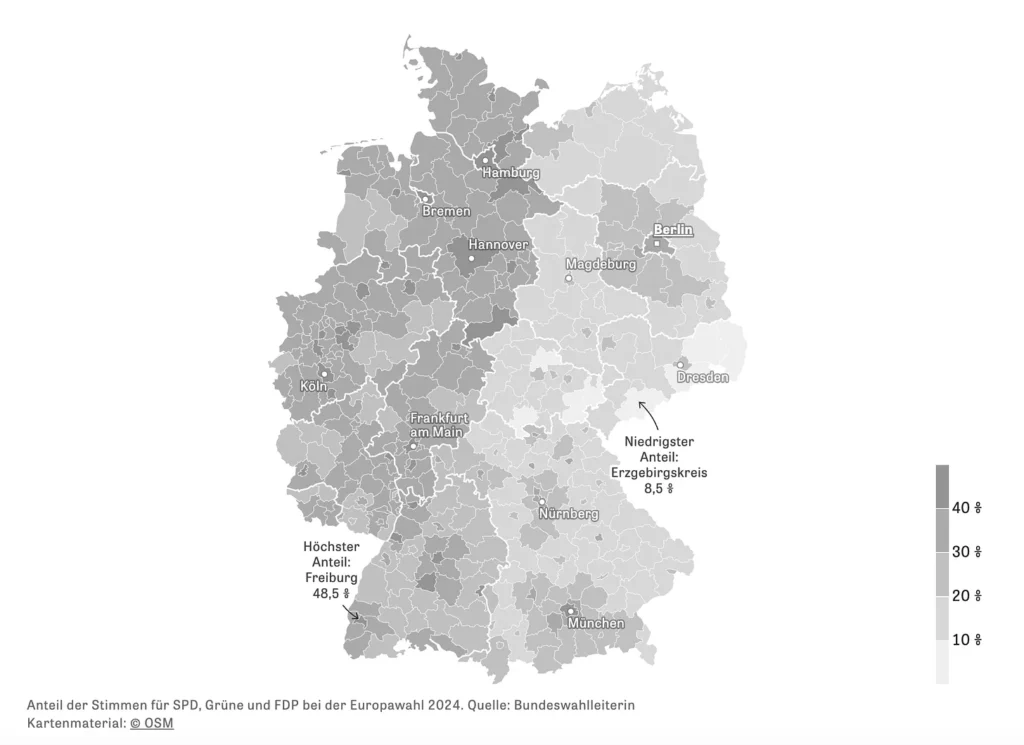
This division follows the Cold War division of Germany into two. Former East Germany led by the revisionist pseudo-socialists, is particularly swayed by neo-fascism. Following the 1988 reunification of Germany the standard of living in the East of Germany remained even more depressed than that of the remaining proletariat of Germany. Hence the appeal of the fascist parties. The usual attacks of workign class living standards was led by the Social Democratic Party (SPD).
While German capital was slow to adopt deregulation and neo-liberalism, after 2010 it went all in with the so-called ‘Hartz Reforms”. These were effected by the SPD:
While deregulation went full swing in the Anglo-Saxon world (Reaganomics, Thatcherism), it was initially adopted half-heartedly in West Germany, … Incisive labour market reforms had to wait for the next government, Gerhard Schröder’s SPD-Greens coalition…. As a good Social Democrat, Schroeder did his part: pushing through the ‘Agenda 2010’ Hartz ‘reforms’ (regressions is a better word I think). Briefly this consisted of increasing part-time contracts; eroding workers committees; lower salaries for agency labour performing the same work; raising ages of retirement and reducing pensions and easing the way for a privatized pension system; reducing ‘allowed’ periods of unemployment from 36 months to 12 months; lowering of thresholds for firing; etc.
Hari Kumar, “An Initial Assessment of Angela Merkel’s Legacy”; Berlin Left; 25/07/2021
The leading SPD member Oskar Lafontaine was a minister, but resigned over this. He formed the broad coalition of the Die Linke – together with Party of Democratic Socialism – the legal successor of the East German state party the Socialist Unity Party of Germany (SED):
“Lafontaine placed himself at the head of the anti-Hartz IV mobilisation and arranged a shotgun wedding with the post-communists of the PDS. The result, in 2007, was Die Linke.”
Tooze A, Ibid; , Chartbook: “#293 “Nope!”
Die Linke became fractured, refused to take a principled left stand – and essentially lost any mass base it had, and became unviable even as a parliamentary party. Its subsequent split was led by Sarah Wagenknecht.
France rejects Macron ‘centrism’ – by endorsing neo-fascists
In France, a huge wave of support pushed the neo-fascist party ‘National Rally’ into leading place in the European elections. It is led by Marine Le Pen and the new demagogue on the national scene – Jordan Bardella – into serious contention for state power:
“National Rally, led by Marine Le Pen and her wildly popular protégé, Jordan Bardella, about 31.5 percent of the vote, and Mr. Macron’s Renaissance party about 15.2 percent.”
Roger Cohen and Aurelien Breeden “Battered by Far Right in E.U. Vote, Macron Calls for New Elections in France”; NYT June 9, 2024
In Le Pen’s wake follow even more openly reactionary forces:
Le Pen’s even more extreme niece, the name of whose party, Reconqute, suggests a “reconquest” of Europe from allegedly alien and especially Muslim inhabitants, as openly advocated by its founder Eric Zemmour.
Timothy Garton Ash; Wake up! After these elections, Europe is again in danger”; Guardian June 10, 2024.
The main structural processes under way
Two defining characteristics are seen regarding the “standard parties”. These are first the loss of any ‘faith’ or trust in them. Closely related to this is the normalisation of neo-fascism. Four aspects are described:
- Trimming the sails of the more open fascists – or sanitisation
The more overt fascist parties in several parts of Europe have voluntarily, or under state pressure been forced to trim sail. The most repugnant features of fully-blown fascism are often discreetly abandoned. Or else they serve as flags that prompt the state or democratic movements, to move to outlaw the neo-fascist parties.
For example in Greece, the “Spartans” and their parent party “Golden Dawn” suffered set-backs:
A small far-right party that unexpectedly entered the Greek Parliament last year will not be allowed to field candidates for the European Parliament this summer after Greece’s Supreme Court found that it was essentially a reincarnation of the banned neo-Nazi party Golden Dawn… the Spartans, “offered their party as a cloak for the new political party of Ilias Kasidiaris,” the former spokesman of Golden Dawn who is currently in prison… Mr. Kasidiaris, who is serving a 13.5-year prison sentence, has campaigned from his cell in a bid to re-enter Greek politics… the Greek government moved to block from Parliament the National Party-Greeks, founded by Mr. Kasidiaris, by pushing through legislation that barred from the legislature parties whose leaders have been convicted of serious crimes.
Niki Kitsantonis, “Far-Right Greek Party Is Banned From E.U. Parliament Elections”; NYT April 25, 2024
In France, Macron’s sudden call to new elections assisted the ‘normalisation’. Marine Le Pen, leader of the National Rally, has worked hard to invalidate charges of obnoxious antisemitism and racism.
Ms. Le Pen, for her part, has distanced herself from Alternative for Germany, or AfD, a far-right party that appears to have become too extreme even for its fellow travelers. In May, Ms. Le Pen and her group in the European Parliament, none of them shy about nationalism, kicked the AfD out after one of its leaders made statements that seemed to justify membership by some in the SS, the Nazi paramilitary force…
“Throwing the AfD under the bus was a fantastic political gift” for Ms. Le Pen, said Jacob F. Kirkegaard .. a senior fellow with the Peterson Institute for International Economics. “She can position herself as ‘not the far right.’”
Emma Bubola “A Surging Hard Right in Europe Stumbles Over Its Own Divisions”; June 3, 2024 NYT
The positions of Le Pen’s party substantiated the label of fascism that had plagued the founder of her party, her own father. To a large extent she has succeeded in disowning him – he was expelled – to camouflage her real intent. Her protégé follows suit:
Mild-mannered but charismatic and media savvy, Mr. Bardella is in many ways the living embodiment of Ms. Le Pen’s years long efforts to normalize her party. A clean-cut, strong-jawed TikTok star, he never raises his voice. Yet his positions on issues like immigration and crime match Ms. Le Pen’s. The difference for a significant number of voters is that he does not share the Le Pen family name — and its unsavory association with the racist and antisemitic roots of the party’s founding as the National Front, by Ms. Le Pen’s father, Jean-Marie Le Pen, in 1972.
Roger Cohen and Aurelien Breeden “Battered by Far Right in E.U. Vote, Macron Calls for New Elections in France”; NYT June 9, 2024
In Germany, the AfD was also forced to trim sail following events of the last 6 months. These included the revelations of secret meetings aimed at a coup; and the open minimisation of Hitler’s regime. There followed mass anti-fascist demonstration. But the AfD has not so made any meaningful positional changes – nor can it:
the AfD is a party so extreme that even Le Pen decided she did not want to be in the same European parliamentary group with it, after Maximilian Krah, its charming lead candidate, said in an interview that not all members of the SS were criminals.
Timothy Garton Ash; Wake up! After these elections, Europe is again in danger”; Guardian June 10, 2024
But a crack has developed in the European neo-fascist front as to how far to take such ‘sanitisation’ or ‘cosmetic’ varnishes.
As the neo-fascist parties drift towards a semblance of respectability, some sections eye a new compact with the older conservative parties. Including Italy – where Georgi Melloni resists critiques for being ‘soft’. This became manifest by opposing Orban’s push for a single neo-fascist block across Europe. Orban’s vision is sweeping:
Orban recently urged Meloni and France’s National Rally presidential hopeful, Marine Le Pen, to create a hard-right “super group” to challenge the mainstream coalitions, the conservative European People’s party (EPP) and the centre-left Socialists & Democrats (S&D). Orban’s big idea seems to be that Fidesz and like-minded parties, such as Poland’s Law & Justice (PiS), Spain’s Vox and the Sweden Democrats rally around Meloni and Le Pen. “The future of the sovereignist camp in Europe, and of the right in general, now rests in the hands of two women,” he told the French magazine, Le Point.
Simon Tisdall; “In thrall to Viktor Orbán and the hard right, Europe is facing its moment of truth”; Guardian and Observer London, 9 Jun 2024
The Italian leader Georgi Meloni is the first female Prime minister of Italy, elected in 2022. She leads the right wing Brothers of Italy (FdI). Since 2020 in the European Union, she also leads the European Conservatives and Reformists Party. She is anxious to “work with” the President of the EU Ursula von der Leyen:
“Meloni’s hopes of morphing into an Angela Merkel-like “essential leader” of a rightwards-shifting Europe, could scupper Orban’s plan. Meloni’s collaboration with the electorally challenged, centre-right commission president, Ursula von der Leyen, reflects wariness over the Orban-Le Pen connection – and a broader split between the hard right and extremist headbangers such as Germany’s Alternative für Deutschland (AfD).“
Simon Tisdall; “In thrall to Viktor Orbán and the hard right, Europe is facing its moment of truth”; Guardian and Observer London, 9 Jun 2024
More recently however Meloni drew back from overtures of von der Leyen. The game proceeds.
- The standard conservative parties steal neo-fascists clothes
The more “reasonable” standard right wing parties have loudly adopted parts of the rhetoric and policies of the neo-fascists. In doing so they ‘normalise’ the practices and policies of the neo-fascist and pave the way for them to move forward. The process is especially clear in France and Germany where one key issue is immigration.
As their theft becomes broader, in some countries there is a move to new party formations of the conservatives. For example the signalled rejection of the Conservative (Tory) part in the UK prompted Nigel Farage to openly proclaim his intent to take over the Conservative Party with the Reform party. Now that the Reform Party has a presence in the Houses of Parliament this will become move evident.
Farage is more likely to succeed in an ultra-right wing make over of the former Tory party, than was Liz Truss and her allies.
- The standard social-democratic parties also steal neo-fascist clothes
In addition, the standard Social Democratic Parties also steal the clothes of neo-fascist parties. In Germany in the last months a drum-beat of tightening the immigration laws is sounded by the SDP. Such parties persist in paying lip-service to prior notions of a social security framework. But meanwhile they continue to steadily erode it. In parallel, new parties posing as being of the left also adopt neo-fascist clothes.
For example the Sarah Wagenknecht Party in Germany. Her origins lay in the former East German left. In an ominous sign – the split she led out of the SPD very recently has adopted her name for the new party – “Alliance Sahra Wagenknecht for Reason and Justice”. A personal naming that portends a personality cult.
Her stand is almost identical with the AfD on immigration. Which class does she represent? In a recent interview her objective position of support of small and middle industry owners – the so-called “Mittelstand” – is made clear:
“Our Mittelstand firms are under massive pressure. In 2022 and 2023, energy-intensive industrial firms sufered a 25 per cent decline in output. That’s unprecedented. They are just starting to announce mass redundancies. These small and medium-sized family-owned firms—lots of them specialist engineering works or makers of machine-tools, auto parts, electrical equipment—are really important for Germany. They’re mostly owner-managed or family-run, meaning they’re not listed on the stock exchange and often have quite a rugged character. But they have their own sort of business culture, focused on the longer term, the next generation, rather than quarterly returns. They’re embedded in their local communities, often doing business-to-business trading. They want to retain their workers, instead of exploiting every loophole, like the big corporations—of which we have plenty, too. It’s the Mittelstand frms that are really suffering in the current crisis. With continuing high energy prices, there is a real danger that manufacturing jobs will be destroyed on a large scale.”
“Sahra Wagenknecht condition of Germany – Interview”: by Thomas Meaney & Joshua Rahtz; New Left Review 146; March-April 2024; further comments by Hari Kumar at: Marxmail May 30, 2024.
Meanwhile the wider body of Social-Democrats in all countries signal to the capitalist class that they do not intend to rain on their parade, saying that the way to progress is to “create wealth” in the country. So says Sir Keir Starmer in the UK. To ensure that no one mistakes where that wealth is to be located, the likely future Chancellor of the Exchequer Rachel Reeves steps in. She insists that there will be no taxes on the top 1% of the income earners – namely the richest of the rich.
- The accentuation of the crisis by two wars
Another major reason for the erosion of any credibility for these parties is their hypocrisy on Gaza. Especially when this is compared to their positions on the Ukraine. For the latter, any amount of arms funding for Ukraine to defend against Russian imperialist attack is given. For the former – enormous support is given to the Israeli state attack on the Gazan people.
What steps can the working class take?
There are two major problems that face the class.
First, there is no mass communist Marxist-Leninist party that can take any leading position.
In its absence, a United Front of all progressive and united forces is needed. Where is this happening? Thus far only in France has there been such a large-scale attempt to form one. The prior history of the distortions of the Popular Front become even more relevant now (the Communist League on Popular Front).
A prior longer version of this was published at MLRG.online
